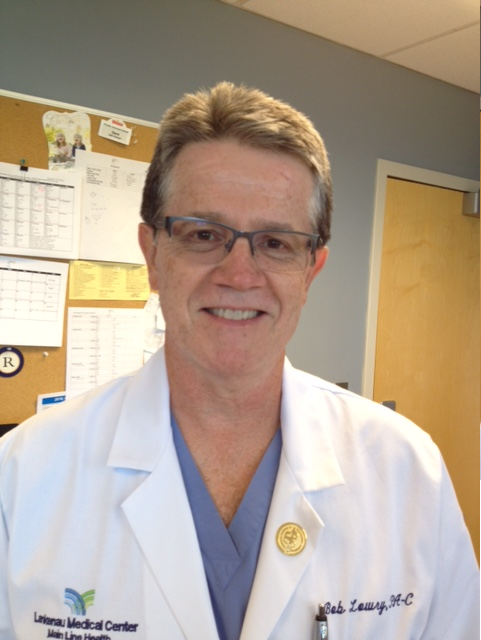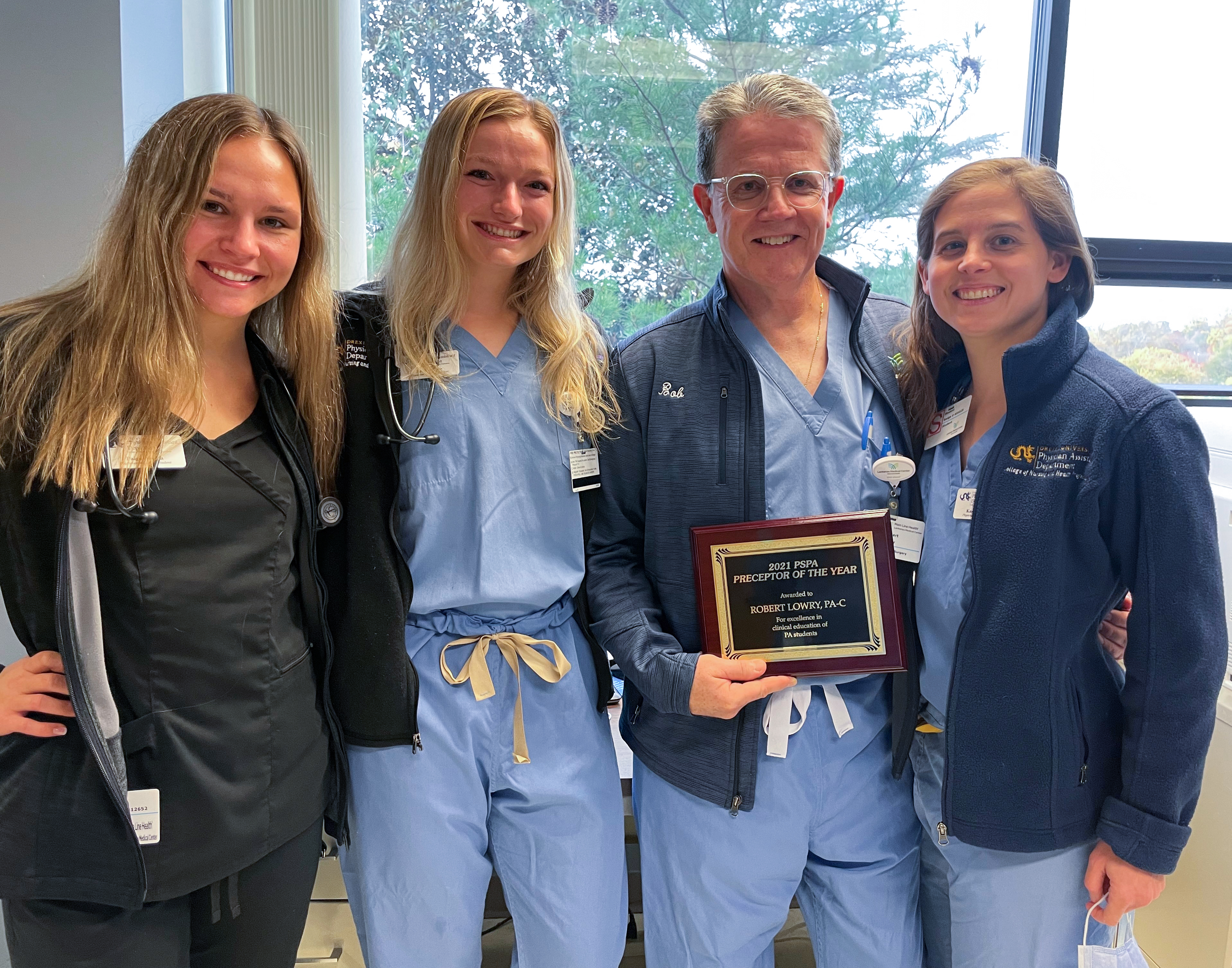Preceptors benefit as much as students from clinical education
October 6, 2022
There are two distinctive parts of physician assistant training—didactic learning and clinical education. The Physician Assistant (PA) program at Drexel University’s College of Nursing and Health Professions is one of the very first in the country, is renowned for its mission toward health equity and places students with some of the best preceptors around. One of those preceptors is Bob Lowry, PA-C, a surgical PA at Lankenau Medical Center.
 Bob Lowry, PA-C, who’s been a PA for 42 years, was nominated by two then-Drexel PA students for and won the Preceptor of the Year from the Pennsylvania Society of Physician Assistants (PSPA) in 2021. It says a lot about his teaching abilities when his students, like Anne Bonner, MHS `21, write letters of support to the PSPA saying Lowry “is an outstanding preceptor who always looks out for his students and always takes into account their interests when giving them different learning opportunities.” Lowry wants to make sure his students have a well-rounded experience—to participate in different cases and learn as much as possible while on their surgical rotation. To that end, he says he shares the Preceptor of the Year award with everyone he works with. “My team of PAs take students under their wings. They do a lot with them as do doctors, nurses and technicians,” he shared. “You’d be surprised how many people pitch in to teach during clinical rotations.”
Bob Lowry, PA-C, who’s been a PA for 42 years, was nominated by two then-Drexel PA students for and won the Preceptor of the Year from the Pennsylvania Society of Physician Assistants (PSPA) in 2021. It says a lot about his teaching abilities when his students, like Anne Bonner, MHS `21, write letters of support to the PSPA saying Lowry “is an outstanding preceptor who always looks out for his students and always takes into account their interests when giving them different learning opportunities.” Lowry wants to make sure his students have a well-rounded experience—to participate in different cases and learn as much as possible while on their surgical rotation. To that end, he says he shares the Preceptor of the Year award with everyone he works with. “My team of PAs take students under their wings. They do a lot with them as do doctors, nurses and technicians,” he shared. “You’d be surprised how many people pitch in to teach during clinical rotations.”
When asked why he became a preceptor, Lowry has two answers. The first is that he wants to give back to a profession that has been so rewarding for him. The other is the clinical experience. “There's no way to make the profession better than to help teach the people who are going to be its next leaders,” Lowry asserted. His students, despite being on their surgical rotation, cover a lot of other ground with him. Of course, they review proper scrubbing techniques and practice knot tying, but what he does goes beyond the confines of surgery. “It is extremely helpful to have a preceptor who dedicates hours each week to discuss various topics in medicine like etiology, epidemiology, clinical manifestations, diagnostic studies and management of different disorders,” wrote Bonner.
 He also has students present histories and physicals (H&P) and all that goes with it, which they review in real time. Drexel alumna, Jaycee Hart, MHS `21, said he carved out several hours of time weekly where she would present a H&P and progress note on two patients of her choosing. “We would then review the patient's disease process, signs and symptoms, diagnostic testing and treatment options,” Hart wrote in her nomination letter.
“This is a lot of work, which they hadn't anticipated, and it surprises them that I ask. But it’s a skill I really want them to leave with,” Lowry insisted. It’s all part of getting students ready for their next steps.
He also has students present histories and physicals (H&P) and all that goes with it, which they review in real time. Drexel alumna, Jaycee Hart, MHS `21, said he carved out several hours of time weekly where she would present a H&P and progress note on two patients of her choosing. “We would then review the patient's disease process, signs and symptoms, diagnostic testing and treatment options,” Hart wrote in her nomination letter.
“This is a lot of work, which they hadn't anticipated, and it surprises them that I ask. But it’s a skill I really want them to leave with,” Lowry insisted. It’s all part of getting students ready for their next steps.
Lowry says that CNHP’s PA program is and has been his go to as a preceptor for a long time. It’s because Drexel’s program has been around about the longest giving it the opportunity to make the didactic and clinical components really solid. “They've been around long enough to get the process down pat. And it's difficult to do the whole thing well, especially the clinical education part.” Lowry also knows CNHP’s students want to change the world. “Their students are invariably very well prepared, very eager to learn and very hard working,” he asserted.
Being a preceptor isn’t for everyone even when you love being a PA. There is so much involved, but if “you love teaching and learning, want to build a great network and want to further the respect of the profession, it’s absolutely wonderful and a fantastic way to give back,” Lowry concludes.
Here is your opportunity to help shape our future clinicians. Please consider becoming a Drexel PA Program clinical preceptor. Our need is great with the continued competition for clinical sites across the country.
Benefits include the following:
- Free Category I CME and access (in person or online) to our annual Board Review Course.
- Free access to Exam Master and Stat Pearls question banks.
- Category II CME Certificate for hours precepting.
- Free access to Drexel University online library resources.
Please contact Ann Madden or Ryan Clancy for more information.
Written by Roberta S. Perry